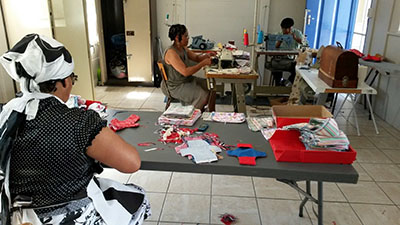
It is with great pleasure that we announce that the multi-disciplinary team from the Siyahluma project (Dr. Sharli Paphitis, Dr. Lindsay Kelland, Prof. Catriona Macleod, Mr. Ryan Du Toit) has been awarded the 2015 Vice Chancellor’s Distinguished Award for Community Engagement.
The Siyahluma project brings together researchers and local NGOs in order to address (1) the menstruation-related challenges faced by school-going girls, most notably a lack of access to reliable and hygienic menstrual products and a lack of access to reliable information about menstruation; (2) a gap in the research on this topic in South Africa; and (3) sustainable community development and capacity-building in the Eastern Cape. The project’s successful collaboration with key community-based partners highlights the benefits of forming relationships and taking a participatory approach to solving community-based issues. This partnership resulted in job creation and creative educational interventions which effectively created safe informative spaces for the discussion of female menstruation for both sexes. Siyahluma is an exceptional program that exemplifies how research, teaching and learning, and community engagement can be harnessed to better understand and move towards resolving social inequality in South Africa.
The Siyahluma research team project comprising a partnership between Rhodes University Community Engagement (RUCE), the Allan Gray Centre for Leadership Ethics (AGCLE), and the Critical Studies in Sexualities and Reproduction Research Unit (CSSR) was formed in 2013. In 2014 a needs assessment survey of approximately 1100 learners in 24 schools across the Eastern Cape was conducted. Using quantitative and qualitative analytic tools in conducting the research, the research team has been able to study the effects of stigma and lack of information about this important biological function. They have also worked hard to implement multipronged initiatives to counteract the lack of access to menstrual products as well as menstrual prejudice and disinformation that affects the academic lives of female learners who come from mostly disadvantaged backgrounds.
The Siyahluma Project has implemented two important critical health education initiatives in close collaboration with community partner organizations. The first of these initiatives was a partnership with FAMSA where the team to designed, implemented and rolled-out a menstruation related health education intervention embedded in a Life Skills programme run in Grahamstown high schools. The second initiative took the form of a community theatre project in partnership with Victoria Girls High School. The VG drama class partnered with Siyahluma to tackle the issue of social stigma, myths and taboos surrounding menstruation and developed a production entitled ‘Siya-Mensa’, which was performed for Grade seven school learners at co-ed schools around Grahamstown. After each performance the Grade twelve learners opened up a space for dialogue between the Grade seven audience, themselves and the research team.
Siyahluma is an example of a program that positively contributes to the transformation of our society by bringing to light the difficulties faced by young women in South Africa’s typically patriarchal, and at times, misogynistic spaces. Disinformation about menstruation is continuous with the wider scourge of sexual violence and, inviting male learners to reflect on menstruation in partnership with female learners is one part of the bigger puzzle of encouraging men to respect the humanity of women and hence to put a stop to the horror that so many women in our country endure in silence.
In 2014, a group of five foster mothers from Grahamstown Child Welfare Services approached the research group with the idea of starting a social enterprise to produce re-usable sanitary products. This initiative was developed because the research findings showed that there is significant menstruation-related challenges facing school-going girls. Access to modern, reliable and hygienic products at an affordable price is one of these challenges. To date, five women have been trained in both sewing and business skills through the Assumption Development Centre and the Days for Girls Program. The reusable menstrual kits produced locally by the women in this group are currently being distributed at local schools in Grahamstown in conjunction with educational materials developed by the research team. Thus, Siyahluma has resulted in the establishment of what will become a sustainable sewing business that produces and distributes sanitary kits free or at minimal cost to girls who are in need.
The award to The Siyahluma Project Group (Dr. Sharli Paphitis, Dr. Lindsay Kelland, Prof. Catriona Macleod, Mr. Ryan Du Toit) will be made at the 2016 Graduation Ceremony. The team will give a public lecture (Key note address) on their collaborative outreach and research initiatives to open Community Engagement Week. The Community Engaged Learning Symposium will take place on the 4th of May at 6.30 pm in Eden Grove Blue. All are welcome and encouraged to attend this event.
CONGRATULATIONS TO THE SIYHLUMA PROJECT GROUP!
Diana Hornby
Director
Community Engagement
Rhodes University
Grahamstown
